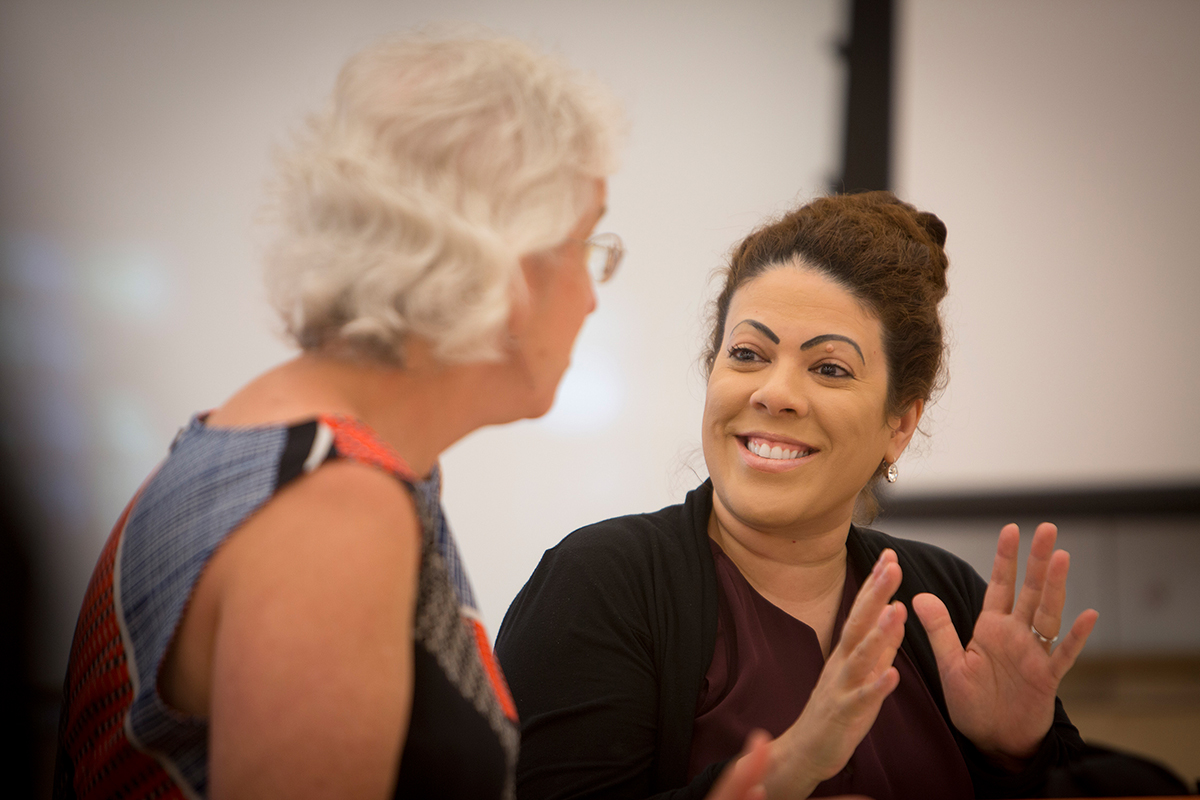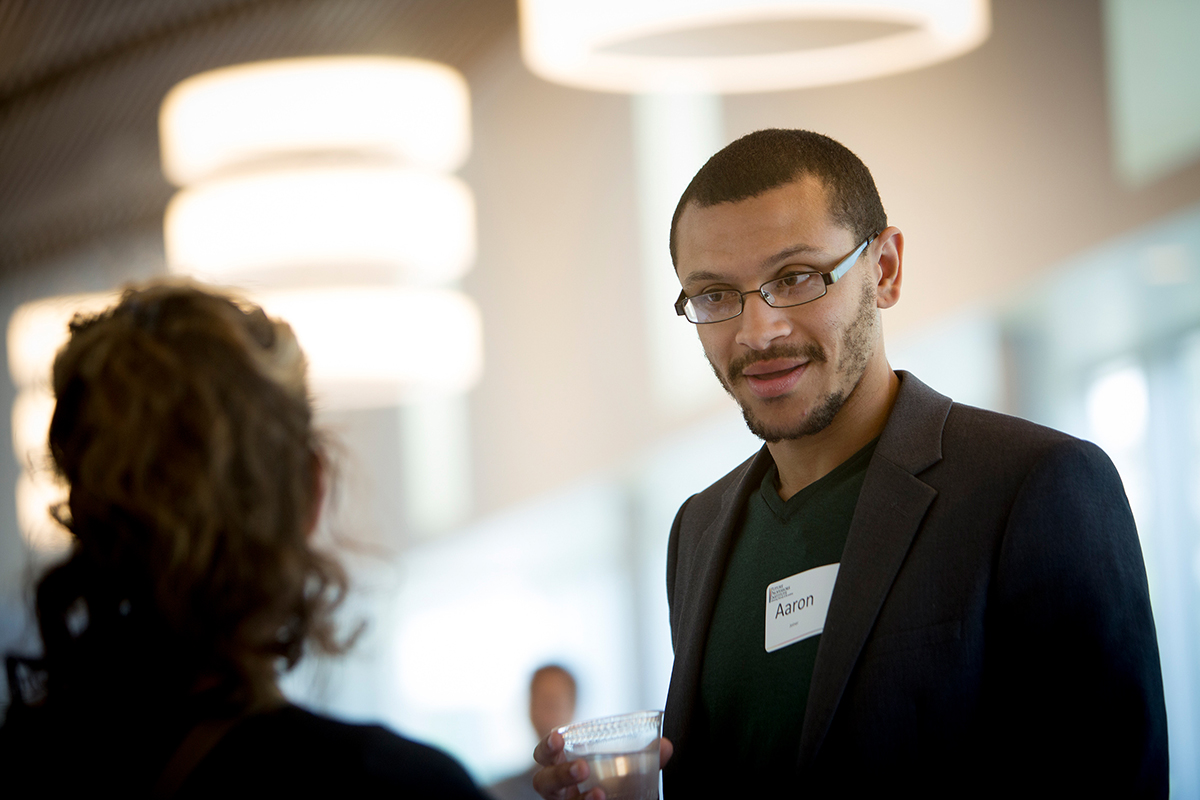Future professors learn academia's unwritten rules
By Susan Kelley

Graduate students and postdoctoral scholars gathered in Stocking Hall recently to learn about a topic that’s strikingly absent at most universities: how to become a professor.
Cornell’s first Future Professors Institute June 28 guided 77 participants, many of whom identify as underrepresented minorities, on the path to a career in the academy.
The volume of underrepresented minorities in the academic pipeline is increasing but remains only a trickle. Among full-time professors nationwide in 2013, just 9 percent were Asian/Pacific Islander, 4 percent were African-American and 3 percent were Hispanic, according to the National Center for Education Statistics.
“We need to expose students to what a faculty pathway might look like and how to prepare for it,” said Sara Xayarath Hernández, associate dean for inclusion and student engagement in the Graduate School.
“The Future Professors Institute is an important partnership with alumni and faculty at Cornell and other institutions to advance our collective efforts to broaden diversity in the academy. It achieves this goal by exposing participants to what it means to be a successful faculty member, along with strategies to cultivate research and teaching opportunities, and the nuances of the faculty work environment,” said Barbara A. Knuth, senior vice provost and dean of the Graduate School.
Workshops focused on practical matters. Topics included establishing a research agenda as a new professor, how to negotiate for a first faculty position and how to find an institution that fits one’s needs. One session was titled “Shake Hands, Kiss Babies and Ask for Money: A Primer on Academic Survival Skills.”
Aaron Joiner, a third-year graduate student in biochemistry, molecular and cell biology, learned that a university’s administrative structure can affect a professor’s salary. Departments in some medical schools, for example, require professors to cover their own salaries with grants. “That can mean the difference between needing one grant to support your lab research versus needing several,” Joiner said.
He also discovered that when negotiating for a faculty position, one can bargain for a discount on fees for core services such as DNA sequencing facilities or mass spectrometry analysis. At many research intensive universities, new faculty can also bargain to have their teaching responsibilities delayed while they establish their research. “That was something I had never thought about,” Joiner said.
Rodrigo Alatriste-Diaz, a seventh-year doctoral candidate in development sociology, said a workshop on understanding what faculty search committees are looking for prompted him to plan for a postdoc. And the institute helped Alatriste-Diaz, who is returning from fieldwork, to build a network for collaboration and support among peers and faculty. For example, he met a new faculty hire, Sergio Garcia-Rios, assistant professor of government and Latino studies, with whom he shares some overlap in research. “This institute provided access to a variety of scholars at various stages of their careers, which is tremendously important for Ph.D. students,” he said.
The 18 faculty panelists came from a range of institutions, from Cornell to Clemson University, Macalester College, Rochester Institute of Technology and the State University of New York at Cortland. That range was intentional, Hernández said, so that participants could understand the academic experience across different types of institutions.

It’s critical for underrepresented would-be faculty to see people like themselves flourishing in the academy, Hernández said. “Nationwide, only two percent of physics Ph.D.s graduating in a particular year are black. It’s hard to be a soloist. It’s hard to be the only one,” she said.
Knuth added, “As the first woman to be hired to the tenure-track faculty in my department at Cornell 30 years ago, I know personally the challenges that can develop when you are bringing different life experiences and perspectives than are held by most (or all) current faculty in a unit. Insights from the Future Professors Institute will help our students anticipate and be better prepared to address these potential challenges proactively.”
Cornell alumni were peppered among the faculty, including plenary speakers Eduardo Peñalver ’94, dean of Cornell Law School; Michael Spencer ’74, M.Eng. ’75, Ph.D. ’80, professor of electrical and computer engineering; and keynote speaker Christine Ortiz, M.S. ’95, Ph.D. ’97, dean of the Graduate School at MIT.
Ortiz encouraged the rapt audience to cultivate resilience in the face of adversity, because success often stems from a series of failures. She pointed out that she, and even Nobel laureates, have a high percentage of rejected publications, grants and proposals. “Success is always paved with a roadway of failures. It’s not that someone is just amazing and has great success. There’s a huge work ethic behind it,” Ortiz said.
She also encouraged participants to be “present and prepared” to take advantage of seemingly small opportunities that can make an enormous difference in one’s career.
That suggestion resonated with Joiner, who learned that lesson as a child, he said.
“Hearing that advice from somebody so successful was a positive reinforcement that some of the things that I’m already doing, that I’m already thinking about, are going to lead me to the right places,” he said.
The institute was sponsored by Cornell’s Graduate School Office of Inclusion and Student Engagement, the Center for the Integration of Research, Teaching and Learning, and the Office of Postdoctoral Studies.
Media Contact
Get Cornell news delivered right to your inbox.
Subscribe